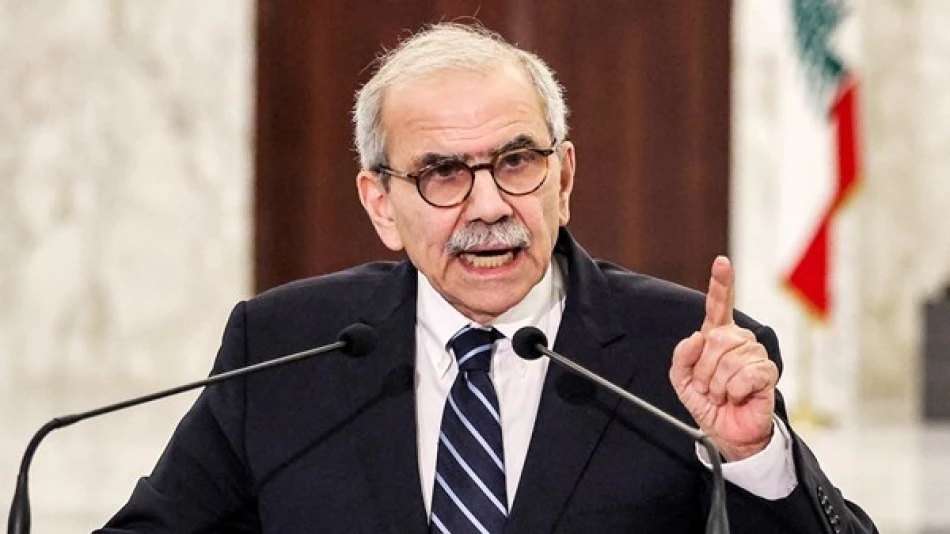
Lebanon to Remain Unstable Until State Monopolizes Weapons, PM Warns
Lebanon's New Government Draws Red Lines on Armed Groups as State Authority Test Looms
Lebanese Prime Minister Nawaf Salam has issued his strongest statement yet on disarming non-state actors, declaring that Lebanon cannot function as a viable state unless weapons are exclusively controlled by government forces. Speaking in Tripoli, Salam signaled a potential confrontation with Hezbollah and other armed factions that have operated with impunity for decades, marking a decisive shift in Lebanon's post-civil war political landscape.
A Direct Challenge to the Status Quo
During his visit to the northern city of Tripoli, Salam was unambiguous about his government's intentions: "The state cannot stand unless weapons are monopolized in its hands alone. Without this, there is no security or stability, and without security and stability, no investment comes and no economy grows."
The timing of this declaration is significant. Salam chose Tripoli—a Sunni-majority city that has historically opposed Hezbollah's dominance—to make his case for state monopoly over weapons. This geographic choice sends a clear message about building a coalition of Lebanese regions that have felt marginalized by armed groups' parallel authority structures.
The Taif Agreement: Three Decades of Unfulfilled Promises
Salam explicitly referenced the 1989 Taif Agreement, which ended Lebanon's 15-year civil war but left crucial provisions unimplemented. The agreement called for the disarmament of all militias and the extension of state authority throughout Lebanese territory—conditions that remain unfulfilled more than 30 years later.
The government has now tasked the Lebanese Army with developing a concrete plan to consolidate weapons under security forces' control before the end of 2024, according to a decision made during an August 5 cabinet session. This represents the most specific timeline any Lebanese government has set for addressing the weapons issue.
Economic Imperatives Behind the Political Rhetoric
Salam's emphasis on the connection between security and economic recovery reflects Lebanon's desperate financial situation. The country has been in economic freefall since 2019, with the currency losing over 90% of its value and basic services collapsing. International donors and investors have consistently cited Lebanon's security fragmentation as a major obstacle to aid and investment.
The World Bank has estimated Lebanon's reconstruction needs at over $15 billion, but donor countries—particularly Gulf states—have made clear that funds will not flow while non-state actors maintain independent military capabilities that could threaten regional stability.
The Hezbollah Question
While Salam avoided naming specific groups, his statements directly challenge Hezbollah's extensive military apparatus, which includes an estimated 100,000 rockets and missiles. The Iran-backed organization has long argued that its weapons are necessary to defend Lebanon against Israel, but critics contend that this arsenal has dragged Lebanon into regional conflicts against the will of many citizens.
The recent Israel-Hezbollah conflict, which ended with a ceasefire in November 2024, may have created political space for such statements. The war's devastation in southern Lebanon and Beirut's southern suburbs has intensified public debate about the costs of maintaining non-state military capabilities.
Regional Context and International Pressure
Lebanon's weapons consolidation challenge mirrors struggles faced by other post-conflict states, but with unique complications. Unlike Iraq, where international forces helped dismantle militias, or Yemen, where the conflict remains active, Lebanon must navigate this process while maintaining its complex sectarian balance and avoiding renewed civil conflict.
The international community, particularly France and the United States, has increased pressure on Lebanon to implement UN Security Council Resolution 1701, which calls for the disarmament of armed groups. Recent diplomatic initiatives suggest that weapons consolidation may be a prerequisite for any serious international support package.
The Path Forward: Implementation Challenges
Salam's rhetoric represents a significant political shift, but implementation will prove far more challenging than declarations. The Lebanese Army, while respected across sectarian lines, lacks the equipment and manpower to forcibly disarm Hezbollah. Any successful weapons consolidation will likely require a negotiated political settlement rather than military confrontation.
The government's end-of-year deadline for presenting a weapons consolidation plan will serve as an early test of Salam's resolve and the international community's willingness to support Lebanese state institutions against armed non-state actors.
Most Viewed News

 Layla Al Mansoori
Layla Al Mansoori






